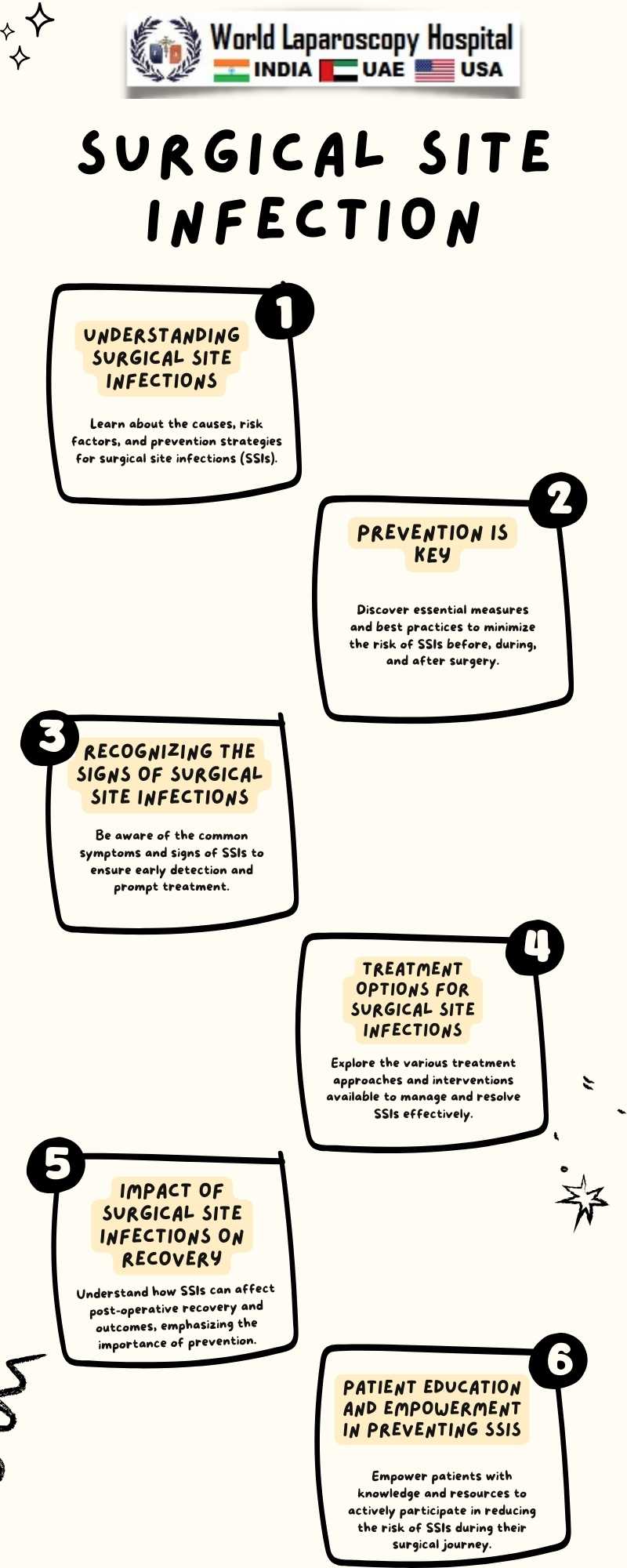Surgical site infection (SSI): Infections that occur at the site of surgery
Title: Surgical Site Infections (SSI): Infections that Occur at the Site of Surgery
Surgical site infections (SSI) are a significant complication that can occur after surgery, leading to increased morbidity, prolonged hospital stays, and increased healthcare costs. These infections can affect the superficial layers of the skin, the tissues under the skin, or the organs and spaces within the body that were involved in the surgery. SSIs are a major concern for patients, healthcare providers, and healthcare systems worldwide.

The causes of SSIs are multifactorial, involving the interaction of various factors such as the patient's immune status, the type and duration of surgery, the presence of underlying medical conditions (e.g., diabetes, obesity), the use of certain medications (e.g., steroids), the presence of drains or foreign bodies at the surgical site, and the adherence to infection prevention protocols. Additionally, the type of microorganisms present in the surgical environment, including bacteria, viruses, and fungi, plays a crucial role in the development of SSIs.
Preventing SSIs requires a multidisciplinary approach that involves healthcare providers, patients, and healthcare systems. Preoperative strategies include proper patient preparation, including skin antisepsis, hair removal, and optimization of underlying medical conditions. Intraoperative strategies focus on maintaining a sterile surgical environment, using prophylactic antibiotics appropriately, and minimizing the duration of surgery. Postoperative strategies include proper wound care, surveillance for signs of infection, and early intervention if an infection is suspected.
Healthcare providers play a critical role in preventing SSIs by adhering to evidence-based practices, such as using sterile techniques, wearing appropriate personal protective equipment, and following proper hand hygiene protocols. Patients can also play a role in preventing SSIs by adhering to preoperative instructions, such as bathing with antiseptic soap, avoiding shaving the surgical site, and informing their healthcare provider of any signs of infection after surgery.
Conclusion:
SSIs are a significant complication of surgery that can have serious consequences for patients. Preventing SSIs requires a collaborative effort from healthcare providers, patients, and healthcare systems. By implementing evidence-based practices and adhering to infection prevention protocols, we can reduce the incidence of SSIs and improve outcomes for patients undergoing surgery.
Surgical site infections (SSI) are a significant complication that can occur after surgery, leading to increased morbidity, prolonged hospital stays, and increased healthcare costs. These infections can affect the superficial layers of the skin, the tissues under the skin, or the organs and spaces within the body that were involved in the surgery. SSIs are a major concern for patients, healthcare providers, and healthcare systems worldwide.

The causes of SSIs are multifactorial, involving the interaction of various factors such as the patient's immune status, the type and duration of surgery, the presence of underlying medical conditions (e.g., diabetes, obesity), the use of certain medications (e.g., steroids), the presence of drains or foreign bodies at the surgical site, and the adherence to infection prevention protocols. Additionally, the type of microorganisms present in the surgical environment, including bacteria, viruses, and fungi, plays a crucial role in the development of SSIs.
Preventing SSIs requires a multidisciplinary approach that involves healthcare providers, patients, and healthcare systems. Preoperative strategies include proper patient preparation, including skin antisepsis, hair removal, and optimization of underlying medical conditions. Intraoperative strategies focus on maintaining a sterile surgical environment, using prophylactic antibiotics appropriately, and minimizing the duration of surgery. Postoperative strategies include proper wound care, surveillance for signs of infection, and early intervention if an infection is suspected.
Healthcare providers play a critical role in preventing SSIs by adhering to evidence-based practices, such as using sterile techniques, wearing appropriate personal protective equipment, and following proper hand hygiene protocols. Patients can also play a role in preventing SSIs by adhering to preoperative instructions, such as bathing with antiseptic soap, avoiding shaving the surgical site, and informing their healthcare provider of any signs of infection after surgery.
Conclusion:
SSIs are a significant complication of surgery that can have serious consequences for patients. Preventing SSIs requires a collaborative effort from healthcare providers, patients, and healthcare systems. By implementing evidence-based practices and adhering to infection prevention protocols, we can reduce the incidence of SSIs and improve outcomes for patients undergoing surgery.
1 COMMENTS
Dr. Sagar Panchal
#1
Feb 24th, 2024 7:12 am
Surgical Site Infections (SSIs) pose serious risks to patients post-surgery. Prevention demands collaboration among healthcare providers, patients, and systems. Through evidence-based practices and infection prevention protocols, we can diminish SSI incidence and enhance surgical outcomes.
| Older Post | Home | Newer Post |

